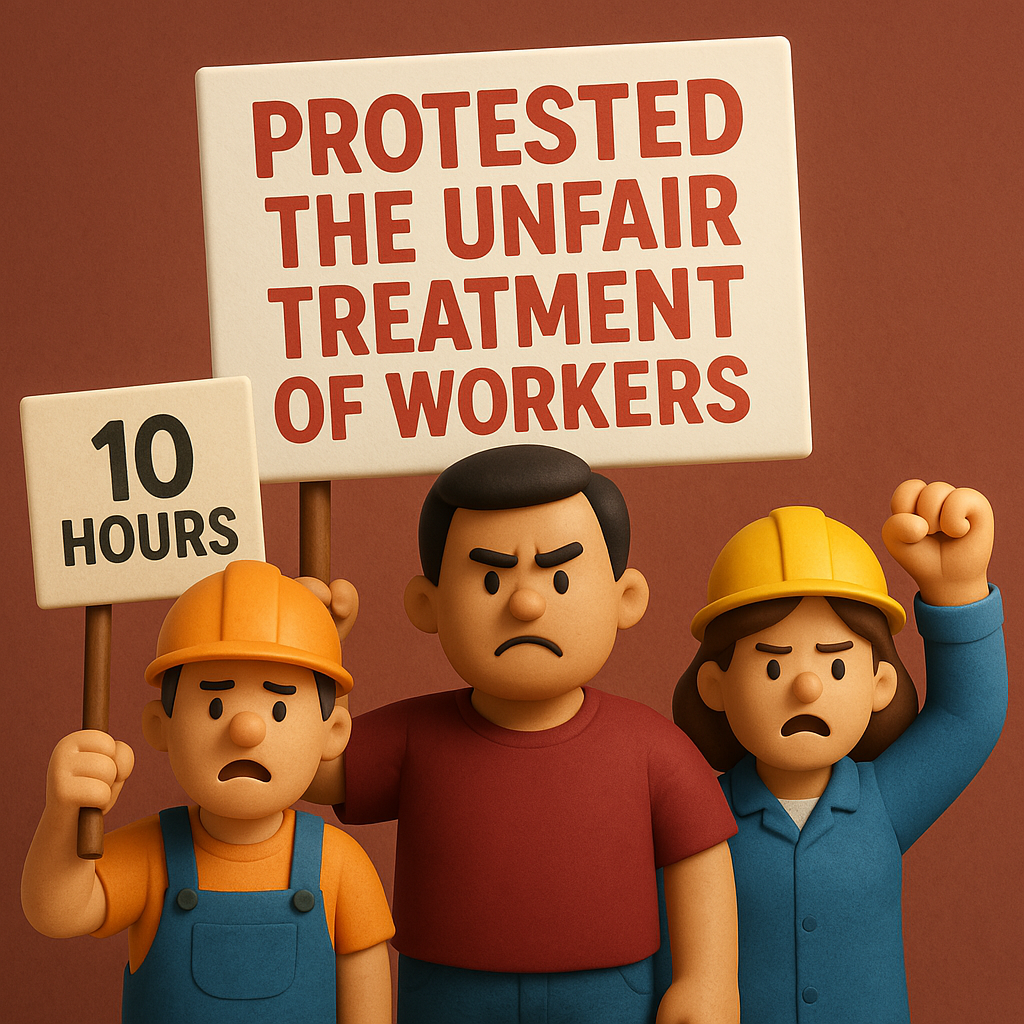Protest
Definition
The term "protest" describes a statement or action expressing disapproval or objection to something, often in a public or organized manner.
Parts of Speech
- Noun
- Verb
Pronunciation
American English
- Noun: IPA Pronunciation: /ˈproʊ.tɛst/
- Verb: IPA Pronunciation: /proʊˈtɛst/
- Respelling: Noun - PROH-test; Verb - proh-TEST
British English
- Noun: IPA Pronunciation: /ˈprəʊ.tɛst/
- Verb: IPA Pronunciation: /prəˈtɛst/
- Respelling: Noun - PROH-test; Verb - pruh-TEST
Etymology
The word "protest" originates from the Latin "protestari," meaning "to declare publicly or solemnly," derived from "pro" (forth) and "testari" (to bear witness). It entered Middle English in the 14th century through Old French.
Derivatives
- Protester (noun)
- Protestation (noun)
- Protesting (verb, present participle)
- Unprotested (adjective)
- Protestive (adjective, rare)
Synonyms
- Demonstration
- Objection
- Opposition
Antonyms
- Approval
- Support
- Acceptance
Usage
The term "protest" is used in social, political, and personal contexts. For example: "The citizens organized a peaceful protest against the new law," or "She protested her innocence in court."
Related Terms
- Demonstration: A public gathering to express an opinion or demand.
- Dissent: The expression of disagreement or opposition.
- Rebellion: Resistance to authority or control.
Detailed Definitions
Noun
- A public demonstration of disapproval: Refers to organized actions taken to express objection.
- Example: "The environmental group held a protest in front of the factory."
- A formal declaration of objection: Refers to expressing opposition in a legal or official manner.
- Example: "A protest was filed against the election results."
Verb
- To express disapproval or objection: Refers to speaking or acting against something.
- Example: "They protested the unfair treatment of workers."
- To declare solemnly or formally: Refers to making a strong affirmation.
- Example: "She protested her innocence during the trial."
protest



🇨🇳 Mandarin
- 抗议 (Protest as in demonstrating against something): Kàngyì
- IPA Pronunciation: /kʰa̤ŋ.î/
- Respelling in English: Kang-yi
- 异议 (Protest as in expressing disapproval or objection): Yìyì
- IPA Pronunciation: /î.î/
- Respelling in English: Yi-yi
🇮🇳 Hindi
- विरोध (Protest as in demonstrating against something): virodh
- IPA Pronunciation: /ʋɪɾoːd̪ʱ/
- Respelling in English: vi-ro-dh
- आपत्ति (Protest as in expressing disapproval or objection): aapatti
- IPA Pronunciation: /aːpəʈʈi/
- Respelling in English: aa-pat-ti
🇪🇸 Spanish
- Protesta (Protest as in demonstrating against something)
- IPA Pronunciation: /pɾoˈtesta/
- Respelling in English: Pro-tes-ta
- Objeción (Protest as in expressing disapproval or objection)
- IPA Pronunciation: /oxekˈθjon/
- Respelling in English: O-hek-thjon
🇫🇷 French
- Manifestation (Protest as in demonstrating against something)
- IPA Pronunciation: /manifɛstasjɔ̃/
- Respelling in English: Mani-festa-syon
- Objection (Protest as in expressing disapproval or objection)
- IPA Pronunciation: /ɔbʒɛksjɔ̃/
- Respelling in English: Ob-jek-syon
🇸🇦 Modern Standard Arabic
- احتجاج (Protest as in demonstrating against something): Ihtijaj
- IPA Pronunciation: /iħ.ti.d͡ʒaːd͡ʒ/
- Respelling in English: Ih-ti-jaj
- اعتراض (Protest as in expressing disapproval or objection): I'etirad
- IPA Pronunciation: /iʕ.ti.raːdʕ/
- Respelling in English: Ie-ti-rad
🇧🇩 Bengali
- প্রতিবাদ (Protest as in demonstrating against something): Pratibad
- IPA Pronunciation: /protibad/
- Respelling in English: Pro-ti-bad
- আপত্তি (Protest as in expressing disapproval or objection): Apati
- IPA Pronunciation: /apot̪i/
- Respelling in English: A-po-ti
🇷🇺 Russian
- Протест (Protest as in demonstrating against something): Protest
- IPA Pronunciation: /prɐˈtʲest/
- Respelling in English: Pro-tyest
- возражение (Protest as in expressing disapproval or objection): Vozrajenie
- IPA Pronunciation: /vɐˈzraʐɨnʲɪje/
- Respelling in English: Vo-zra-zhe-ni-ye
🇵🇹 Portuguese
- Protesto (Protest as in demonstrating against something)
- IPA Pronunciation: /pɾoˈtɛʃtu/
- Respelling in English: Pro-tesh-to
- Objeção (Protest as in expressing disapproval or objection)
- IPA Pronunciation: /objɛˈsɐ̃w̃/
- Respelling in English: Ob-je-sawn
🇮🇩 Indonesian
- Protes (Protest as in demonstrating against something)
- IPA Pronunciation: /ˈprɔ.tɛs/
- Respelling in English: Pro-tes
- Keberatan (Protest as in expressing disapproval or objection)
- IPA Pronunciation: /kəbəˈratən/
- Respelling in English: Ke-be-ra-tan
🇩🇪 German
- Protest (Protest as in demonstrating against something)
- IPA Pronunciation: /pʁoˈtɛst/
- Respelling in English: Pro-test
- Einwand (Protest as in expressing disapproval or objection)
- IPA Pronunciation: /ˈaɪ̯nvant/
- Respelling in English: Ein-wand
🇯🇵 Japanese
- 抗議 (Protest as in demonstrating against something): Kōgi
- IPA Pronunciation: /koː.ɡi/
- Respelling in English: Ko-gi
- 異議 (Protest as in expressing disapproval or objection): Igi
- IPA Pronunciation: /i.ɡi/
- Respelling in English: I-gi
🇻🇳 Vietnamese
- Biểu tình (Protest as in demonstrating against something)
- IPA Pronunciation: /biəw˨˩ tiɲ˧˥/
- Respelling in English: Bieu tinh
- Phản đối (Protest as in expressing disapproval or objection)
- IPA Pronunciation: /ɸaːn˦ˀ˥ zoi˧˥/
- Respelling in English: Phan doi
🇰🇷 Korean
- 시위 (Protest as in demonstrating against something): Siwi
- IPA Pronunciation: /ɕi.wi/
- Respelling in English: Shi-wi
- 이의 (Protest as in expressing disapproval or objection): Iui
- IPA Pronunciation: /i.ui/
- Respelling in English: I-ui
🇹🇷 Turkish
- Protesto (Protest as in demonstrating against something)
- IPA Pronunciation: /pɾotesˈto/
- Respelling in English: Pro-tes-to
- İtiraz (Protest as in expressing disapproval or objection)
- IPA Pronunciation: /i.tiˈɾaz/
- Respelling in English: I-ti-raz
🇵🇰 Urdu
- احتجاج (Protest as in demonstrating against something): Ehtijaj
- IPA Pronunciation: /eːt̪ɪd͡ʒaːd͡ʒ/
- Respelling in English: Eh-ti-jaj
- اعتراض (Protest as in expressing disapproval or objection): Aitraz
- IPA Pronunciation: /ɪt̪ɪˈrɑːz/
- Respelling in English: Iti-raz





